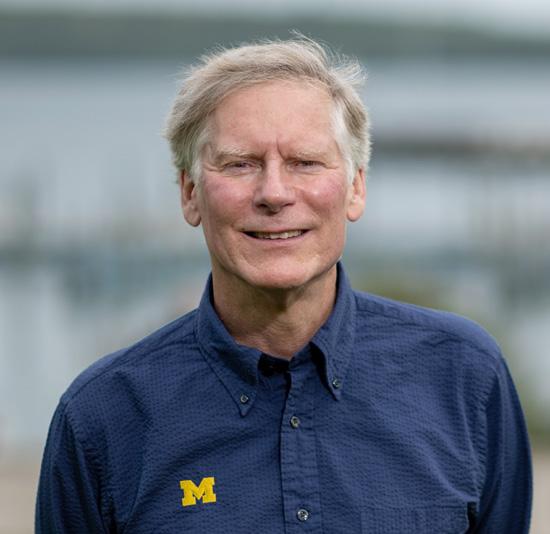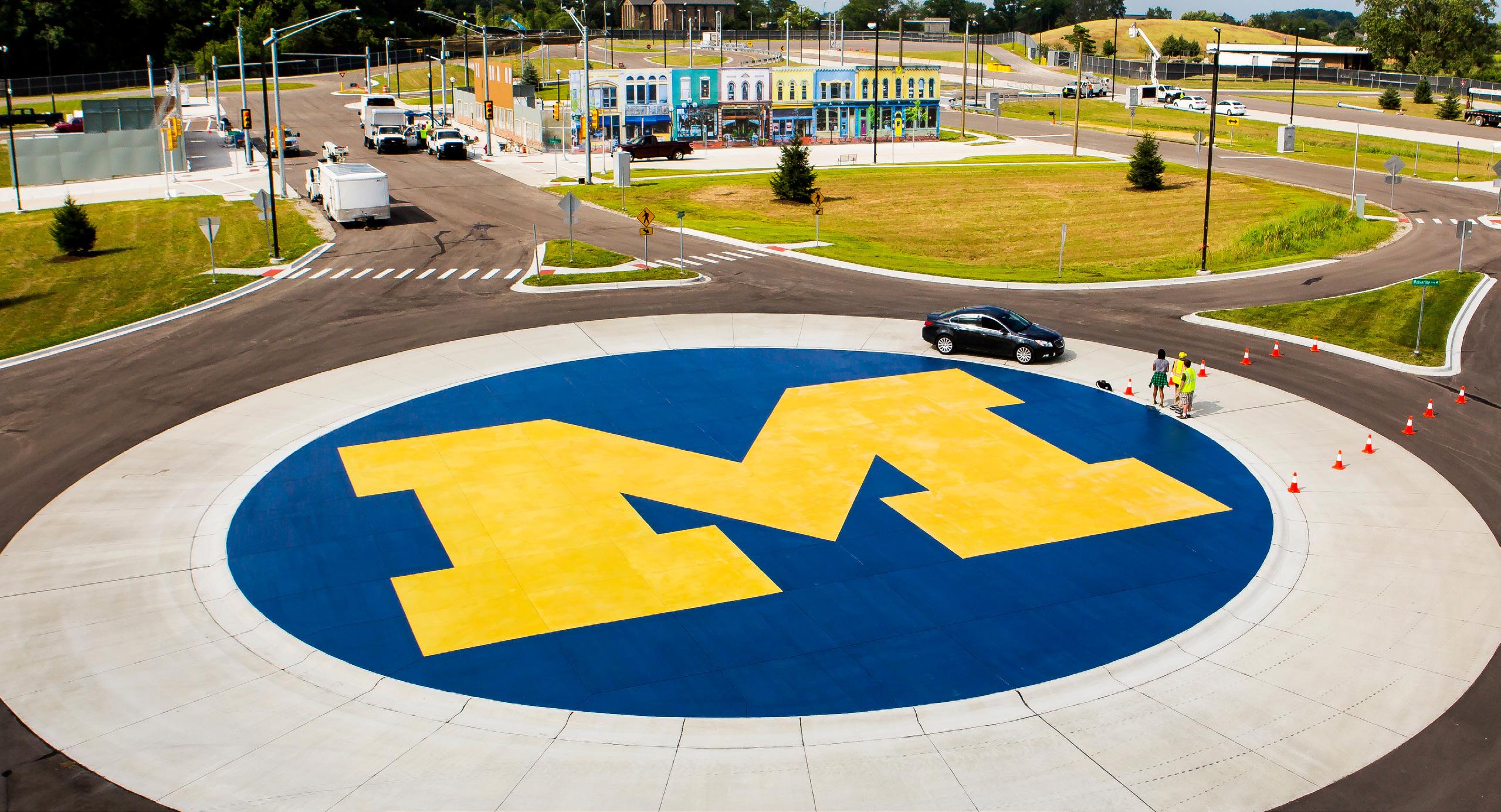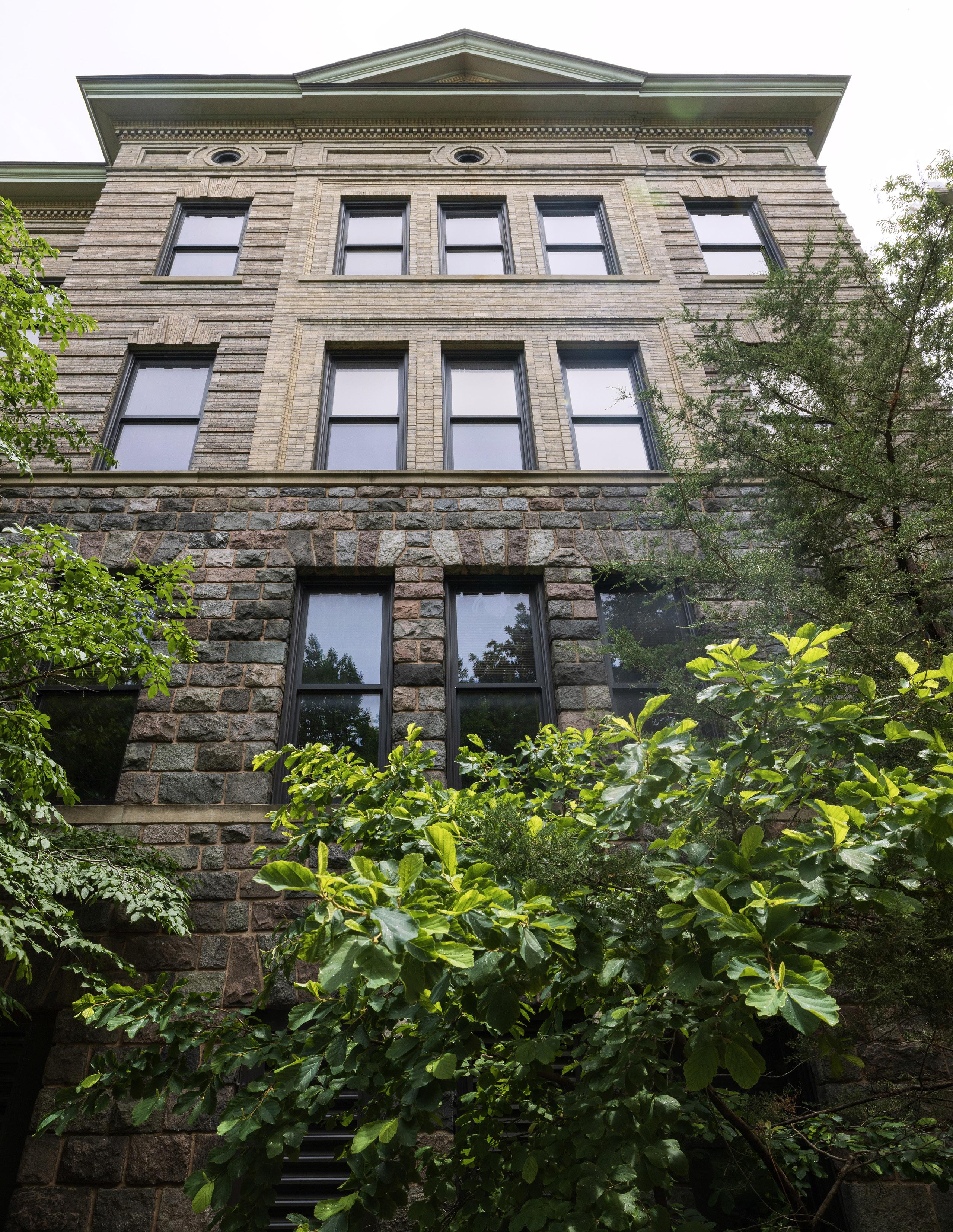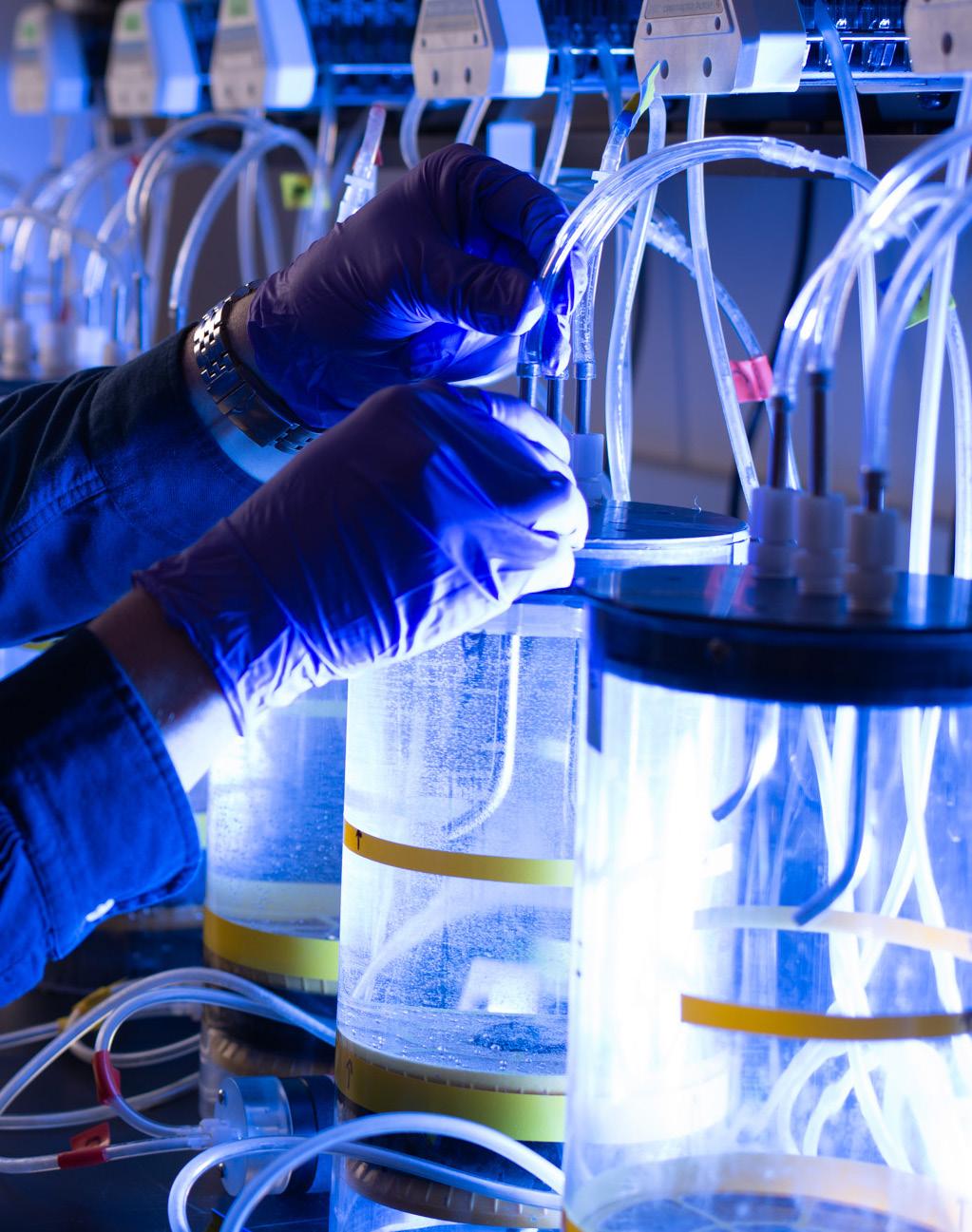

INVENT TOMORROW
A CAMPAIGN FOR THE SCHOOL FOR ENVIRONMENT AND
SUSTAINABILITY


U-M SEAS DEAN JONATHAN OVERPECK
“Invent tomorrow. This is exactly what we do at the University of Michigan School for Environment and Sustainability (SEAS). Environmental education was founded here, and we have always led the charge with the energy and creativity it takes to find innovative and bold solutions. Inventing tomorrow means that we must challenge the status quo to move the world forward, whether through technology and research or policy development and community engagement.
Humankind sits at a profound intersection of time when tomorrow is at risk. Luckily, the challenge and opportunity to solve the toughest problems, set new trajectories and make the world a better place is what gets us up each day. In this defining moment, where today’s decisions and actions will significantly impact the long-term health of the planet and all its inhabitants, I invite you to partner with us in our next campaign as we invent a sustainable tomorrow.”




OUR INVENTIVE SPIRIT
At the University of Michigan School for Environment and Sustainability (SEAS), we work every day to create an environmentally sound, sustainable and just future for all. It’s what we do. It’s what we’ve always done.
With world-renowned faculty, researchers, students and alumni at the forefront of cutting-edge scholarship and impact, we know better than anyone that solving Earth’s most complex and pressing issues is no small feat. It takes special skills, knowledge and guts to meet the future with confidence.
At SEAS, we say, “Bring it on.”
As the founders of environmental education, we have plenty of other firsts under our belts and are grounded in a culture of holistic and hopeful thinking, forging ahead with unmatched motivation and an impact-driven mindset that fosters partnerships and collaborations—across campus, around the Great Lakes, between continents and with you.
Our approach to solving challenges is imaginative, bold and optimistic, with interdisciplinarity at our core. At SEAS, we convert research into action with a commitment to weaving sustainability into conservation, business, engineering, urban and rural planning, landscape architecture, public policy, law and beyond. This is why, when you support SEAS, the impact is felt not just within our school, but across the entire University of Michigan campus and into society.


CURRICULUM INNOVATION FIRSTS MATTER BECAUSE THE WORLD CAN’T WAIT FOR SECONDS.
We are known for our early vision and implementation. Throughout SEAS’ history, we have changed the game in environmental fields with the innovations and achievements of our alumni, faculty and students. From being the first in the U.S. to offer forestry courses in the late 19th century and launching the first environmental justice program in 1992, to being the first to create a sustainable systems program and now using leading technologies such as artificial intelligence and virtual reality in groundbreaking ways, we’re the leaders that other universities strive to emulate.
What we understand at SEAS, and what many others miss, is that solving environmental challenges often requires going well beyond traditional studies and demands the expertise of sustainability professionals who are tapped into every aspect of the human enterprise. This is why we are the trailblazers who have always combined classroom instruction with
experiential learning in society. In 1985, we were the first environmental school to offer team-based and interdisciplinary master’s projects, founded on the belief that problems are best solved collaboratively in the real world. In addition to internships and field-based research, SEAS students have long gained the wide range of expertise needed to become or influence the decision-makers who can change the course of humanity.
At SEAS, we’re developing the evolving blueprint for higher education, where theory meets practice and passion fuels progress to tackle environmental issues unlike any we have faced before. Essential to charting our path of firsts is continuing to advance technology and digital resources to ensure that the education we offer remains cutting-edge, accessible and influential to the widest possible range of students and researchers.


GROWING OUR PROGRAMS NEVER DONE BEFORE?
WE’VE DONE THAT.
Research at SEAS is focused on unlocking a future where humanity thrives in harmony with Earth’s natural systems, driving innovation and collaboration across every area of sustainability and environmental science.
Our visionaries are at the forefront of technology and community engagement, addressing challenges like evolving mobility, food systems, stormwater challenges, biodiversity loss, urban thriving and energy systems, while inspiring hope through action to halt and adapt to climate change.
At SEAS, we’re all in, focused on examining the intersection of human aspirations, activism, markets, technology, justice and policy to ensure a future where humans and nature both flourish. Whether it’s through our undergraduate Program in the Environment or any one of our eight graduate specializations—Behavior, Education and Communication; Ecosystem Science and Management; Environmental Justice; Environmental Policy and Planning; Geospatial Data Sciences; Landscape Architecture; Sustainability and Development; and Sustainable Systems—we break boundaries to imagine solutions in new ways.

PROGRAM FOCUS AREAS
CITIES, MOBILITY & BUILT ENVIRONMENT
SEAS experts are on the cutting edge in catalyzing sustainable living environments and better modes of transportation. Combating climate change requires developing new systems and strategies in expanding cities around the globe, and in rural areas as well. All of SEAS, including the Center for Sustainable Systems, work together at the nexus of ecological design, technological advancements, climate change, energy, food systems, water systems, socioeconomic disparities and much more to create the living environments of tomorrow.

CLIMATE AND ENERGY
Climate change increasingly affects all that humans do and all of the natural world. Interdisciplinary SEAS experts work across and off campus to understand and tackle the ever-growing range of complex energy and climate change challenges that need solutions. This means research and innovation to halt climate change and, at the same time, to build resilience to the climate change that can’t be halted.
Combining the knowledge from scholarship with the know-how that our off-campus partners bring to the table is key to solving a complex puzzle that requires realistic solutions to help individuals, communities, businesses and all of society transition to an affordable, thriving and low-carbon world. We’re all in, with multiple SEAS-led efforts helping to accelerate climate action across campus, including the MI Hydrogen and the Climate Action Plus initiatives.

CONSERVATION AND RESTORATION
To comprehend humanity’s impact on global ecosystems and biodiversity, it is crucial to understand how different environments adapt to a rapidly changing world. Our landscape architecture program is one of the few to deploy ecological principles authentically in environmentally responsible design. Additionally, our experts in the SEAS-led cross-campus Institute for Global Change Biology (IGCB) focus their research on the interactions among the main drivers of global environmental change, including climate, pollution, human migration, biodiversity loss and land use. The IGCB seeks to enhance our understanding of critical knowledge gaps and learn how to ensure a secure future for the Earth’s ecosystems and biodiversity.

ENVIRONMENTAL JUSTICE
SEAS is the birthplace and long-term leader of environmental justice education and practice, and we believe that equitable access to a healthy environment and sustainable solutions are essential to creating the future we strive for. At SEAS, justice is infused in all we do, with the understanding that true sustainability means that all must benefit from the solutions we help develop. The Tishman Center for Social Justice and the Environment at SEAS is a unique and critical presence in higher education that helps to ensure equitable sustainable solutions in Michigan, across the nation and the world.

ENVIRONMENTAL POLICY AND BUSINESS
At SEAS, we know that proactive public policies and forwardthinking companies and investors speed the adoption of sustainable innovations for society. We are leaders in examining the interplay between civil discourse, legal and regulatory frameworks, and the various communities affected by policy, all while understanding common touch points facing different stakeholders. Our work through the SEAS Sustainability Clinic in Detroit matches teams of faculty and students with local organizations to address environmental issues that Detroiters are grappling with, such as intensifying flooding, deadly heat waves and energy poverty. In addition, the Erb Institute—a 25-year partnership between SEAS and the Ross School of Business—is dedicated to bringing business leadership into the game, bridging the gap between industry and the creation of a more sustainable world.

FOOD SYSTEMS
The Sustainable Food Systems Initiative at U-M engages a large cross-campus interdisciplinary mix of students and faculty with communities across local to global scales to enable food systems that support a healthy climate and are nutritious, economically viable, equitable and ecologically sound. Through our determined and broadly partnered efforts, we are charting a new normal that promotes sustainable and secure food supplies at home and around the globe.

HUMAN HEALTH
Wildfires, extreme heat, infectious disease, global pandemics, increased rainfall intensity and flooding—these threats are affecting more people each year—and with the acceleration of climate change, are becoming more frequent, damaging and costly, posing greater risks to human health. At SEAS, we’re laser-focused on understanding the short- and longterm health impacts of environmental disasters, and the leading interventions needed to improve emergency preparedness and health outcomes.
Through the Kathy and Steve Berman Western Forest and Fire Initiative, a socially engaged, problem-oriented research program focused on western forests, fires and communities, we’re working to improve society’s ability to manage forests to mitigate the risks of large wildfires, revitalize human communities and adapt to climate change.

Austin Crane (MS ’22), loads test organisms into the in-situ Toxicity Identification Evaluation (iTIE) system during a technology test run at Saginaw Forest in Ann Arbor, Michigan, to help develop the iTIE system as a tool that can be used to detect and quantify contamination in aquatic ecosystems.

WATER
SEAS works across campus and off to ensure success in addressing the critical infrastructural and ecological issues that affect the long-term viability of our water resources—locally and globally. It’s no secret that water is central to Michigan’s identity and economy and, at SEAS, we house three of the most prominent Great Lakes research initiatives: Michigan Sea Grant, the Cooperative Institute for Great Lakes Research and the Great Lakes Integrated Sciences and Assessments program. Further cementing our status as the leading institution in global water sustainability is the Global Center for Climate Change Impacts on Transboundary Waters, established at SEAS in 2023.


BUILDING OUR CAMPUS THE DANA BUILDING AND BEYOND
Staying at the forefront of cutting-edge education, research, and sustainability action means we’re growing, and with that comes the need to update and expand our physical spaces. Renovations would bring the beloved Dana Building, home to SEAS in the very center of campus, to the next level of effectiveness and functionality, while a new collaborative research and innovation center on North Campus would allow the University of Michigan to solidify its place as THE Great Lakes University and home to the research and innovation needed to ensure water sustainability not just locally, but globally.

INVESTING IN TALENT
SEAS GRADUATES AREN’T JUST PRACTITIONERS, THEY’RE BOLD, FEARLESS LEADERS
SEAS graduates have built a reputation as bold, fearless leaders. It’s well known that SEAS and the University of Michigan provide access to an interdisciplinary educational ecosystem unmatched in depth and breadth. This is why we attract individuals serious about becoming the game changers the world needs, whether it be supporting Fortune 100 companies in prioritizing and implementing sustainability practices, leading award-winning design and planning firms, or working tirelessly to diminish the threat of childhood lead poisoning.
The transition to a more sustainable, clean energy future will create new jobs and demand new skills and talent. Expanding the workforce will be critical, and SEAS is leading this charge, which is why supporting students continues to be a top campaign priority. The more funding we can offer students, the more likely they are to study at SEAS. By increasing funding for student aid, we aim to broaden access to our nationally leading graduate programs and our undergraduate Program in the Environment, and empower leaders ready to meet the climate, environment and sustainability challenges of the 21st century.




INVESTING IN LEADERSHIP
PASSION FOR THE FUTURE OF
HUMANITY
Attracting and retaining top faculty is the linchpin to providing our students with the best possible instruction while serving as the epicenter for environment and sustainability breakthroughs. We hear it time after time—the privilege to work with our esteemed faculty is a top reason students choose SEAS. And from our alumni, who go on to secure highperforming careers, we hear about the impact of faculty on their paths and, ultimately, their success in positively influencing the future of humanity and the planet.
For more than a century, SEAS has attracted and inspired pioneers in education, research and public partnership, spearheading many fields of study that are today considered
standard, such as forestry, landscape architecture, environmental education, conservation and comprehensive life cycle assessments, as well as launching the field of environmental justice.
By combining the theoretical and the practical, our faculty has and will continue to shape the complex systems that determine the health and future of the planet and all its inhabitants. More than ever, we need these passionate visionaries to spark solutions to what lies ahead, to empower our students to have the largest possible impact, and to ensure a sustainable future.

THE DIFFERENCE BETWEEN CHALLENGE AND OPPORTUNITY
IS THE WAY ONE
SEAS.
Look to SEAS at the University of Michigan for what’s coming tomorrow. We’re passionate about sparking solutions for the most pressing challenges—in Michigan, across the nation and around the world. With your support and partnership, we can do so much more. Reimagining our planet starts today. Be part of it.

Casey Godwin and his colleagues at the Cooperative Institute for Great Lakes Research use laboratory experiments to understand how sediments at the bottom of the lakes affect ecosystem-scale problems like harmful algal blooms, nutrient pollution and seasonal hypoxia.

